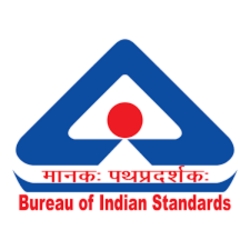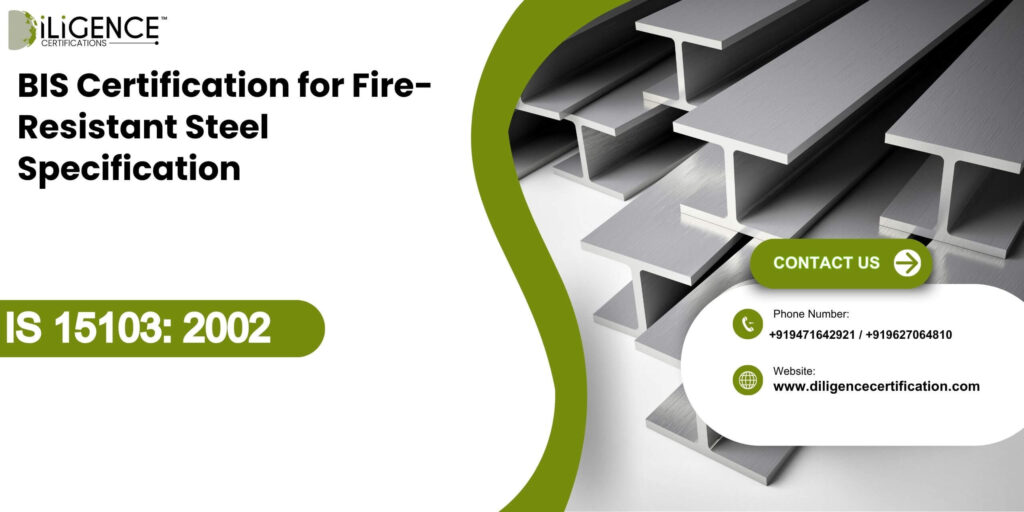- It delineates the features of the metal used in the construction of Fire-Resistant Steel holding the structural integrity.
- Steel must retain strength up to 600°C for 3 hours.
- Covers two grades: FR-Fe410 and FR-Fe490.
- The specification calls for tensile tests at elevated temperatures as well as standard chemical and mechanical tests.
- It is subject to mandatory BIS ISI certification for production and sale.
Introduction

IS 15103:2002 sets the requirements for structural steel that is capable of resisting fire in buildings and industrial types of structures where the ability to withstand high temperatures is mandatory. Through this standard, the metal is allowed to maintain the required strength for a heat exposure of up to 600°C for 3 hours. Besides, it defines the metal composition, the mechanical properties, and the test methods with a special emphasis on the tensile tests at elevated temperatures. Being a part of the mandatory BIS certification system in India, it is a guarantee of fire-resistant steel products that are safe and up to standard. Bureau of Indian Standards
What is 15103:2002?
IS 15103:2002 is an Indian Standard that specifies the requirements for fire-resistant structural steel used in buildings and industrial structures. The steel is intended to be a carrier of less than the steel strength at a fire temperature. The standard provides for chemical composition, mechanical properties, and the requirement for mandatory elevated-temperature testing to ascertain fire resistance.
Key Points:

- Defines the characteristics of structural fire-resistant steel products.
- The steel must be able to carry the load at 600°C for 60 minutes or longer.
- Grades are FR-Fe410 and FR-Fe490.
- The standard requires tensile and bend tests with high-temperature tensile tests being also part of the scope.
- It is among mandatory BIS certification standards for manufacturing and sale. ISI MARK
Why is BIS Certification Mandatory
BIS certification has been made a must by the Government of India in order to have products that first meet the essential quality, safety, and reliability standards before they are sold or used. In the case of fire-resistant steel and other similarly critical materials, mandatory certification serves as a means of safety in avoiding failure, hence, avoiding dangerous situations.
Key Reasons:
- First of all, one of the main reasons for mandating a BIS certification is public safety: certified products have to fulfill the strictest requirements in terms of performance and safety.
- What is more, BIS continuously monitors the manufacturing process so that no unsafe or low-quality materials find their way to the market, thereby, preventing the appearance of substandard products.
- On the other hand, the government places certain products under Quality Control Orders (QCO) which means that BIS certification is a legal requirement for manufacturing, importing, or selling such products.
- In that way, the ISI mark acts as a guarantee that the product has undergone testing and meets the standards set by the country, thus, making the consumers trust it more.
- Moreover, it supports the evolution of uniform standards: the companies are at the same level quality-wise, and the safety of the structures and industries is ensured.
Importance and Benefits of BIS Certification
| Importance | Benefits |
| Ensures product safety and reliability | Builds customer trust and confidence |
| Prevents sale of substandard or unsafe products | Improves brand reputation and market acceptance |
| Maintains uniform quality across manufacturers | Helps manufacturers access wider markets |
| Mandatory compliance under government QCOs | Avoids legal penalties and regulatory issues |
| Protects public health, property, and infrastructure | Ensures long-term performance and reduced failures |
Step-by-Step Process of BIS Certification

Step1:Documentation
- Collect required business and product documents
- Ensure compliance with BIS standards
- Prepare technical files and product details
- Verify authenticity of all submitted records
Step2:Product Testing
- Send product samples to a BIS-recognized lab
- Conduct tests as per relevant Indian Standards (IS)
- Obtain an official test report
- Fix issues if the product fails and retest
Step3:Application Submission
- Fill out the BIS registration form online
- Upload documents and test reports
- Pay the required government fees
- Track application status on the BIS portal
Step4:Scrutiny and Inspection
- BIS reviews documents and test reports
- Factory inspection may be conducted (if applicable)
- Clarifications or additional documents may be requested
- Compliance is verified before approval
Step5:Grant of License
- BIS issues the registration certificate
- Unique R-number or license number is provided
- Manufacturer can affix the BIS mark on products
- Renewal required as per BIS validity timeline
Documents Required for BIS Certification
| Category | Documents Required |
| Business Documents | Business license/registration, ISO certificate, organizational details |
| Manufacturer Details | Factory layout, process flow chart, machinery list, production details |
| Product Documents | Product specifications, component list, user manual, model details |
| Testing Documents | Test report from BIS-recognized lab, sample details, test request form |
| Legal & Compliance | Authorization letter, brand ownership proof, trademark certificate (if any) |
| Import/Foreign Manufacturer (If applicable) | AIR (Authorized Indian Representative) details, contract agreement, overseas manufacturer documents |
Timelines, Costs, Validity & Renewal
- Timelines: Generally 20-30 days; the testing time is 7-15 days.
- Costs: Government + testing fees depend on the product; there might be some additional charges.
- Validity: In most cases, the validity period is 2 years.
- Renewal: It is performed prior to the expiration; updated documents/tests are required; the renewal period
Why Choose Diligence Certifications
- Expert team with strong BIS and regulatory knowledge
- Fast, streamlined processing to reduce approval delays
- Accurate documentation and testing coordination
- Transparent guidance with clear communication
- High success rate and complete end-to-end support
Conclusion
BIS certification is an essential factor in product safety as it ensures to the Indian authority that the product complies with the set requirements regarding safety, quality, and performance. When it comes to essential materials like fire-resistant steel, the certification is a way of giving assurance that the product has the capability of enduring the hard conditions, and safety can be relied upon. The implementation of BIS conformity is a kind of protection for consumers and at the same time, producers can take advantage of it in the ways of increasing their reputation, driving away the low-quality competitors, and making the market entry process easier.
Frequently Ask Questions
What is IS 15103:2002?
IS 15103:2002 is an Indian Standard that defines the technical requirements of fire-resistant structural steel which can be used in the construction of buildings and industrial structures.
Why is BIS certification necessary for fire-resistant steel?
BIS certification is very important to ensure the safety of end-users, as it is the main confirmation that the material is of good quality and can be relied upon even under very stressful situations like a fire in high-temperature conditions. In order to fulfill this requirement, a BIS certification is thus indispensable.
What temperature and duration is the steel supposed to withstand according to the standard?
This standard requires metal to maintain its structural integrity for a maximum time of 3 hours at the temperature of 600°C.
Is BIS certification compulsory for production and selling of fire-resistant steel in India?
Indeed, activities of this kind must be accompanied by BIS certification. It is the QCO (Quality Control Orders) which is the tool that implements this regulation that operates the enforcement.
What Laboratory Work is Expected under IS 15103:2002?
The enumeration of the experiments includes chemical analysis, mechanical testing, bend tests, and elevated-temperature tensile tests.
Who is in charge of submitting the application for BIS certification?
Any locally produced fire-resistant steel obtaining the BIS certification is a must for the Indian market. Moreover, the Indian foreign manufacturers should also go for BIS certification.
How long is the time uninterrupted by BIS certification in the Indian Subcontinent?
This situation ordinarily lasts from 20 to 30 days. The period is dependent on the time taken for the tests and the verification of the documents.
What are the Document Requirements Needed for BIS Certification?
Here are some examples of documents: business particulars, product descriptions, factory setup, test reports, authorization letters, and compliance certificates.
What happens to a product that fails BIS testing?
The producer is responsible for taking measures to solve the issue, upgrade product quality, and then sending the product for testing once again.
What is the duration of BIS certification?
The duration of BIS certification is normally two years after which a renewal request comprising updated documentation and testing (if needed) should be filed.








 BIS Certification
BIS Certification
 CDSCO
CDSCO
 CPCB
CPCB
 LMPC
LMPC
 WPC Approval
WPC Approval
 Global Approvals
Global Approvals
 TEC
TEC
 ARAI
ARAI
 BEE
BEE
 ISO Certification
ISO Certification
 DGCA Certification
DGCA Certification
 NOC For Steel
NOC For Steel



















 Business Registration
Business Registration















 Legal Services
Legal Services
 Trademark Registration
Trademark Registration
 Copyright Registration
Copyright Registration
 Patent Registration
Patent Registration















































